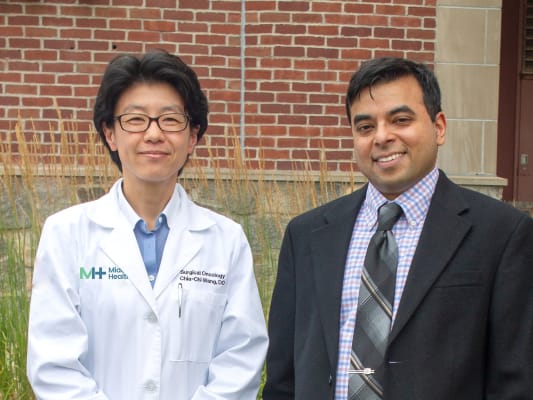Pancreatic Cancer: What You Need to Know

Did you know that 10 to 15 percent of all pancreatic cancer cases are due to genetics? This is why Dr. Nadeem Hussain, Middlesex Health’s chief of gastroenterology, says it is so important to know your risk.
Middlesex Health offers pancreatic cancer screenings to those who have a reasonable risk of pancreatic cancer based on their personal and family histories. In general, screenings often begin between ages 45 and 50, or 10 to 15 years younger than the youngest relative with pancreatic cancer.
Screenings include a contrast-enhanced MRI and possibly a secretin stimulation test. During a secretin stimulation test, a hormone is given to increase the secretion of juices within the pancreatic gland and enhance imaging. Together, these tools allow doctors to get detailed and reliable views of the pancreas.

An endoscopic ultrasound can also be used to evaluate the pancreatic gland. This procedure involves passing an endoscope through the esophagus into the stomach and small intestine to visualize the pancreas and possibly obtain samples of fluid. It can complement the MRI and increase the odds of discovering and diagnosing lesions early.
In addition to viewing the actual organ, pancreatic cancer screenings can also involve input from a genetic counselor. Genetic counseling is available through the Middlesex Health Cancer Center.
Signs and symptoms
Pancreatic cancer is the fourth leading cause of cancer-related death in both males and females, and the average age at the time of diagnosis is 60. Symptoms of pancreatic cancer include:
- Lack of appetite
- Upper abdominal pain
- Weight loss
- Nausea
- New onset of diabetes at a late age
- Jaundice
- Elevated liver enzymes
Treatment
If you are diagnosed with pancreatic cancer, treatment can vary and can include surgery, chemotherapy and/or radiation therapy. At the Middlesex Health Cancer Center, Dr. Chia-Chi Wang, a fellowship trained surgical oncologist, works in collaboration with gastroenterologists, geneticists, medical oncologists and radiation oncologists and is committed to providing the best care. In addition to performing more traditional surgery, Dr. Wang also performs robotic surgery, a minimally invasive procedure that results in smaller incisions, meaning less discomfort, less scarring and a faster recovery.
Learn more
To learn more about pancreatic cancer screenings, or to make an appointment, call 860-347-4620. You can also visit middlesexhealth.org/pancreatic-cancer.
Featured Physicians

Nadeem Hussain, MD
Locations
- Middletown, CT
860-347-4620
- Essex, CT
860-347-4620
- View Full Profile
- Accepting New Patients

Chia-Chi Wang, DO
Specialties / Areas of Care
- Surgical Oncology
Locations
- Middletown, CT
860-358-2850
- Westbrook, CT
860-358-2850
- View Full Profile
- Schedule an Appointment
- Accepting New Patients
More Stories
Tips From The Mayer Center
In recognition of Autism Acceptance Month, Middlesex Health's The Mayer Center shares tips for parents of children who may be on the autism spectrum.
The Benefits of Acupuncture
Acupuncture, a form of integrative medicine, can ease pain and help with stress management. Acupuncture can also help if you are dealing with long COVID!